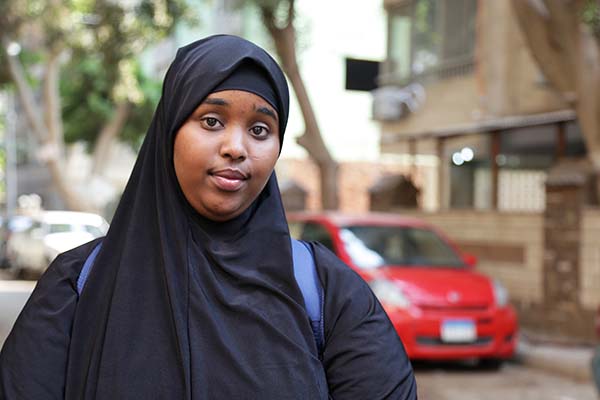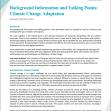

Education for Refugees in Egypt
Asma Mohamed Salbel, an 18-year-old refugee now living in Egypt, grew up in Somalia without parents.
“I lived with people who weren’t my parents, and I didn’t have money to go to school,” Asma says.
Through donations, she managed to complete 10th grade, but the challenges she faced in Somalia were too great. At just 16 years old, she decided to travel to Egypt by herself.

Asma Mohamed Salbel grew up in Somalia without parents. Now a refugee in Egypt, she was accepted into Catholic Relief Services’ Accelerated Learning Program, funded by UNICEF and private funds.
“I want to continue my education, enter university and medical school,” Asma says. “This is my dream.”
Since education is so important to Asma, she applied and was accepted into Catholic Relief Services’ Accelerated Learning Program. The program, funded by UNICEF and private funds, is for refugee children who have dropped out of school. All the children in the program came to Egypt without a parent or legal guardian, or were separated from them in the process. When they first join the program, they are given basic English, Arabic and math classes.
Kiya*, an 18-year-old from Ethiopia, especially likes the English classes. He’s not fluent yet and the accent is difficult. Still, he’s eager to keep going.
“I want to learn languages to help me to communicate with people,” Kiya says. “I want to learn so we can help other people who want to learn and get them into an education program.”
More than 4,000 unaccompanied and separated children are registered as refugees and asylum seekers in Egypt—the majority are from Eritrea, Ethiopia, Sudan, South Sudan and Syria. They often struggle to meet their basic needs.
“It’s very challenging, and you can see that from the level of attendance,” says Noha Eldakrory, a CRS education project officer. “The students are not always able to attend regularly because they are faced with financial problems, health problems and psychological problems. But instead of letting them just stay at home we encourage them to go to school and give them the tools to cope.”
In addition to academics, the program teaches good study habits, stress management, time management, budgeting and other life skills. CRS also hosts a camp where program students can meet other people their age who are in school.
“It’s an opportunity for them to hear stories of how others managed to continue in school,” says CRS education program manager Farah Atiah.
By the end of the program, the transformation of students—even despite their considerable difficulties—is remarkable.
“Each individual has gained something different,” Eldakrory says. “You have the student who was very shy in the beginning, and then he started to mingle and he developed social skills. You have another student who didn’t know a word of Arabic, but by the end of the program she is speaking Arabic very well.”
For 17-year-old Nyala, a refugee from Ethiopia, the hard work of pursuing an education is well worth it.
“Everyone has a goal they want to reach,” Nyala says. “There are challenges that face everyone. You should not give up and always try to reach your goals.”
*Names have been changed to protect privacy.




